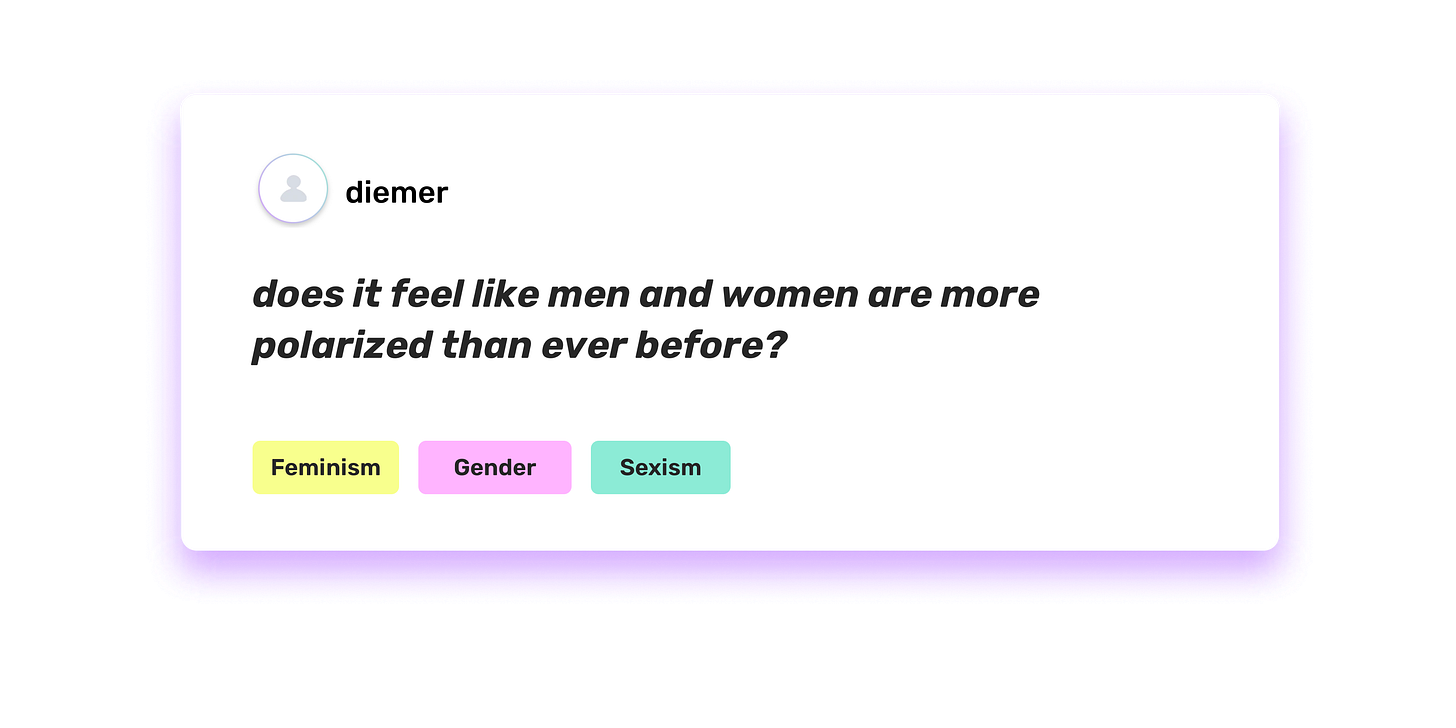In today’s essay, our cofounder Emma Bates reflects on some words of wisdom from Esther Perel.
But first, here’s what else people are talking about on Diem:
I’m trying to let go of what my boyfriend did before we were official
I've gained so much as a mum but lately I've been fixated on all the things I've lost.
My friends, most of the time, would get in touch with me only to find out that they need something.
Last week, a friend had a spare ticket and invited me to Esther Perel’s show in New York — which was so good, FYI. At the beginning of the show, Perel talked about how relationships and sexuality are deeply influenced by the cultural context of the place we live, that cultural differences shape our ideology of love, marital roles, conflict, values, taboos, etc. They impact our expectations of potential partners and our expectations of ourselves in a relationship, and shape what we believe is “good” or “bad.” Something I hadn’t truly considered, which Perel pointed out, is how cultural shifts (eg. gender equality movements) deeply impact tensions in relationships and vice versa. Rifts and tensions in expectations from prospective or committed partners can indicate a cultural inflection point in societies. It turns out, that cultural inflection point is now.
All of this made me think back to The Financial Times’ “A new global gender divide is emerging” article by John Burn-Murdoch, and this now-viral graph. The last decade has seen seismic shifts that impacted our culture in ways we have not yet fully realized, especially as it pertains to gender equality. In the U.S., Donald Trump’s victory laid fertile ground for the rise of the global #MeToo movement. That was closely followed by the reversal of Roe v. Wade, and is now playing out in the gender ideology gap.
“It would be easy to say this is all a phase that will pass, but the ideology gaps are only growing… This shift could leave ripples for generations to come, impacting far more than vote counts.” — John Burn-Murdoch
Take South Korea’s (iconic) 4B movement. It is a prime example of the long-lasting impacts that the past decade of cultural shifts may have on society. TLDR: The 4B movement is a protest against South Korea’s patriarchal state. The movement started around 2019, and is a community that envisions a future without men. It came off the back of increasing rates of femicide, revenge porn, and spy-cam sex in the country, all of which were going largely unprosecuted. The thousands of members in the movement are protesting the patriarchy by leaving it behind altogether.
The “Four Nos” of the 4B movement are: no sex with men, no child-rearing, no dating men, and no marriage with men. As Anna Louie Sussman stated in The Cut’s viral “A world without men,” while 4B’s adherents may hope to change society — through demonstrations and online activism, and by modeling an alternative lifestyle to other women — they are not trying to change the men whom they view as their oppressors. In their view, Korean men are beyond redemption, and Korean culture is misogynistic. If the above graph is anything to go by, they’re not wrong.
It feels like no coincidence that movements like this, as well as the lighter, cultural phenomenons of girlhood, are happening at the same moment that incel culture, violence against women, and the “manosphere” are globally on the rise. Combined with women’s financial independence and not really “needing” a male partner in the way previous generations did for home ownership and financial security, it certainly feels like heterosexual men and women have never been more at odds with one another.
One of the very first essays I wrote for this newsletter a few years back explored a question I got asked by a (male) friend of mine: “Do you think men are the enemy?” It wasn’t the first time I’d heard a question like it. Often when I tell men about Diem there’s a level of defensiveness in their response.
I believe this happens because men are the historic holders of all power, so when something (Diem, in this case) is built to create more equality across power structures, it feels like a threat. But really, when I think about building Diem, it's not to take down men — I'm not actually thinking about the male experience at all. I’m thinking about the impact access to community and collective wisdom has had on the female experience for generations. Relatedly, while it's pretty easy (and definitely funny) to make jokes at the expense of the patriarchy, is this marketing doing us a disservice when it comes to bringing new, equitable solutions into the world? As much as I enjoy it, the "fuck the patriarchy" messaging is starting to seem like an overdone relic of feminist capitalism. It’s also something that has likely contributed to the polarization of gendered ideologies and political beliefs, in turn impacting the interactions men and women are having with each other from dating culture to the workplace.
I really don’t have any idea how we move forward from here, but I’d love to hear your thoughts. Do you feel like we’re at an inflection point in feminism? Do you feel like men and women are clashing more? Does anyone know how to fix it??
ICYMI
Side Friends and Tip Culture
Welcome to The Briefing, a roundup of the best of girl internet (AKA Diem) this week. You’re receiving this because you’re subscribed to The Things We Don’t Talk About. If you’d like to opt-out of The Briefing, head here. Forwarded this email? Subscribe now for the best of Diem every Tuesday and Friday.
Before you go…
If you love Diem, we’d love for you to rate and review us on the App Store! 🫶







